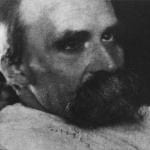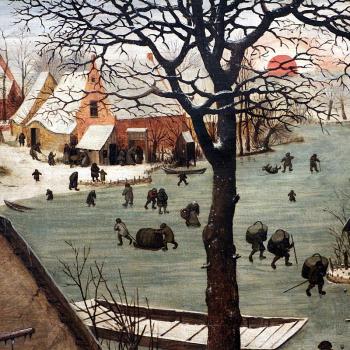His alternative is complicated. It makes no sense for me to explore the entire thing here. What is worth pointing out is that his imagined future, while not at all some kind of Nazi state as some seem to think (in spite of Nietzsche’s hatred for anti-Semites—those he thought the most small-minded and resentful of all), must leave room for actions we would now find unthinkable. The killing of the weak by the strong, for one. Executions would likely need to return on a larger scale. What we term “cruelty” would have to make a comeback (though Nietzsche himself would say our Judeo-Christian ideals are the cruelest of them all). Most importantly, there would have to be room for rule by great people, not by the unwashed masses, but by those who are better based on this new “good-ideal.” Inequality would be the reality. Through the voice of his Zarathustra so Nietzsche speaks:
How do I thank my morning dream for allowing me to weigh the world early this morning? As a humanly good thing it came to me, this dream and consoler of the heart! And in order to do by day what it does, and to imitate it and learn its best, I now want to place the three most evil things on the scale and weigh them humanly well. He that taught to bless here also taught to curse: what are the three best-cursed things in the world? These I want to place on the scale. Sex, lust to rule, selfishness: these three have been cursed best and slandered and lied about most so far – these three I want to weigh humanly well. […]
Utterly disgusting and despicable to it are those who never defend themselves, who swallow poisonous spittle and evil stares; the all too patient, all-enduring, all-complacent: for they are the servile kind. Whether a person is servile before gods and gods’ kicks, or before human beings and stupid human opinions: all servile kind it spits on this blissful selfishness! Bad: that is what it calls everything that is struck down, stingy and servile; fettered blinking eyes, oppressed hearts, and those false, yielding types who kiss with broad cowardly lips. And pseudo-wisdom: that is what it calls everything that servants and old men and weary people witticize; and especially the whole nasty nitwitted, twitwitted foolishness of priests! The pseudo-wise, however, all the priests, the world weary and whoever’s souls are of the woman’s and servant’s kind – oh how their game has always played tricks on selfishness! And precisely that was supposed to be virtue and be called virtue, that they played evil tricks on selfishness! And “selfless” – that is how they wished themselves, with good reason, all these world-weary cowards and cross spiders! (Thus Spoke Zarathustra, 150, 152-153)
Once upon a time, there were Nietzschean atheists on the Right, people who read his works and saw that the new world he called for required changes in values that would be uncomfortable for people. In many cases, they got Nietzsche terribly wrong—tying his work to overt, racial anti-Semitism, for example. They still, however, saw something we too often miss.
Enter Anthony Ludovici:
Ludovici was one of the first and most accomplished translators of Nietzsche into English and a leading exponent of Nietzsche’s thought. Ludovici was also an original philosopher in his own right. In nearly forty books, including eight novels, and hundreds of shorter works, Ludovici set forth his views on metaphysics, religion, ethics, politics, economics, the sexes, health, eugenics, art, modern culture, and current events with a clarity, wit, and fearless honesty that made him famous. Last year, Counter-Currents issued Ludovici’s previously unpublished autobiography, The Confessions of an Anti-Feminist. An excerpt from it, “On the Jewish Question,” has been published on this site, and F. Roger Devlin has reviewed it in “A Man Out of Season.” (Counter-Currents Publishing)
He was, to put it briefly, a eugenicist, a defender of aristocracy, and—most of all—a committed Nietzschean. His ire for religion was unrelenting; he thought it weak, instilling in people instincts that did little more than make them servile vermin. Nowhere is this sentiment clearer than in his poem “Creeping back to the cross”:
(A belated reply to that too-numerous body of field padres of all denominations, who, to the discredit of the fighting men during the Great War, used to boast that the perils and tortures of the Front Line had reaped a rich harvest for the Churches.)
When all advance is stopped and the defeat
Of companies that flank you bars retreat;
When your last cartridges have long been spent
And all have suffered heavy punishment;
When friends are lying either maimed or dead,
Or else got windy early on and fled;
When wounds gape menacingly and your thirst
Invades your lips and causes them to burst;
When all that keeps the enemy at bay
Is just the gath’ring dusk of dying day
And morning waits the sun of yonder hill
To come down from the eastern sky to kill.
Then, if you’re not the weakling one whose way
In wretchedness and torture is to stray
Back to the God of weaklings in dismay —
In short, if you don’t feel the need to pray —
Then, be you pagan, boor, or atheist,
The world is yours to do with as you list!
(“Creeping back to the cross”)
A few stanzas from his “My testament” are equally instructive:
Post no priest beside my litter,
Carve no cross upon my bier!
As a Christophobist bitter
Let me pass unchurched from here!Sing no hymns when I am buried,
Put no pennies in my palm!
I’ll not clamour to be ferried
To the shore of peace and balm.[…]
Even if I be instructed
To appear before the throne,
Whence a godhead has conducted
World affairs since time unknown,If moreover he engages
His recording angel there,
To recite a few score pages
Of my sins, let him beware!I will range his whole creation,
From the tapeworm to the fly,
And expect his explanation
As to why, and why, and why?
(“My testament”)













